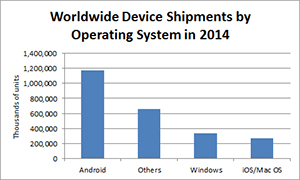News
Microsoft Fudging Standards in IE 11 To Avoid 'Degraded' Mobile Experience
Microsoft plans to release an updated Internet Explorer 11 mobile browser with the next release of Windows Phone 8.1 that will address some Web site compatibility issues.
The improved browser will show up next week for users of the "Windows Phone 8.1 Preview for Developers" version. It will appear more generally for Windows Phone 8.1 users "in the coming months," according to Microsoft's Thursday announcement. Arrival will depend on mobile service providers plans for releasing the next update to Windows Phone 8.1.
Alleged Mobile Web Problems
Microsoft plans to fudge some existing standards with this next release of the IE 11 mobile browser because of the content display problems it has been observing across popular Web sites. The display problems were due, in part, to developers not using standards-based technologies, Microsoft claimed. Moreover, many Web sites appeared to be designed more for iOS-based devices than for other device types, including Microsoft's Windows Phone.
"Unlike the mostly standards-based 'desktop' web, many modern mobile web pages were designed and built for iOS and the iPhone," Microsoft's announcement claimed. "This results in users of other devices often receiving a degraded experience."
Consequently, Microsoft plans to make the mobile user experience work well for IE 11 users despite what the standards may imply. Those nonstandard code changes will start to show up in the browser with the next release of Windows Phone 8.1.
"Based on your feedback, we pursued a web experience for IE users consistent with what is available on iOS and Android devices -- even where this meant we would be adding non-standard web platform features," Microsoft's announcement explained. "We believe that this is a more pragmatic approach to running today's less-standardised mobile web."
These nonstandard additions to IE 11 resulted in a 40-percent improvement in the IE 11 mobile browsing experience across 500 Web sites, according to Microsoft's testing.
Microsoft's engineering team found that many sites designed to accommodate mobile traffic were supporting specific features based on "a legacy vendor specific prefix" while ignoring the standards-based approach. In addition, some mobile sites used "non-standard proprietary APIs that only work with Safari or Chrome," the team claimed.
Sites also used faulty browser detection methods. Specifically, they would not recognize IE to be a mobile browser, Microsoft complained. When IE did not support a feature, these sites had "no graceful fall-back" to address the problem, Microsoft stated.
With the next Windows Phone 8.1 release, Microsoft plans to map some of the more popular WebKit-prefixed APIs to standards currently supported in IE11. Both Google Chrome and Opera browsers use the WebKit engine. Microsoft also plans to fix problems with IE 11's Trident engine with the Windows Phone 8.1 Update release. Specifically, the engineering team will address "navigation issues with location.hash and some CSS layout problems."
Microsoft noted that the Pointer Events HTML5 recommendation isn't widely supported. Pointer Events is a method that supports mouse, pen and touch inputs in browsers. Instead, many Web sites follow the older Touch Events approach. As a result, Microsoft will add IE 11 support for Touch Events with the Windows Phone 8.1 Update release.
IE 11 also will get some usability improvements with the next Windows Phone 8.1 release, which Microsoft described in May.
Turnabout for Microsoft
Microsoft's present-day mobile Web dilemma represents a strange turnabout for the company. Not too many years ago, Web developers frequently complained about having to create site content that would work with Internet Explorer 6, which was considered by them to have too many quirks and to not follow standards.
Today, Windows for the desktop, which was once reputed to control 90 percent of the operating system market, has been eclipsed by the proliferation of mobile OSes, particularly Android. For instance, June data from Gartner Inc. showed that three times more Android devices were shipped in 2014 compared with Windows devices (see chart). Windows Phone OS use is sometimes measured today at around 3 percent, although Gartner expects that figure will increase to 10 percent by 2018.
 [Click on image for larger view.]
Worldwide device shipments by operating system, June 2014. Includes mobile phones, ultramobiles, tablets and PCs. Source: Gartner Inc. Forecast.
[Click on image for larger view.]
Worldwide device shipments by operating system, June 2014. Includes mobile phones, ultramobiles, tablets and PCs. Source: Gartner Inc. Forecast.
The proliferation non-Windows mobile OS platforms may have prompted developers to create Web site content that is less attuned to Microsoft's Internet Explorer browser. If so, that's an ironic change, since Microsoft has long embraced HTML5 standards for its Internet Explorer releases, going back at least as far as its IE 9 release.
In other Windows Phone 8.1 news, Microsoft also announced this week that it plans expand its Cortana personal assistant distributions, add Live Folders to the user interface and enable virtual private network connections using Wi-Fi, among other enhancements, when it releases the Windows Phone 8.1 Update.
About the Author
Kurt Mackie is senior news producer for 1105 Media's Converge360 group.